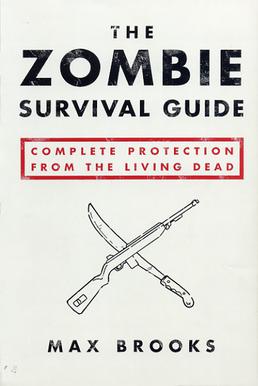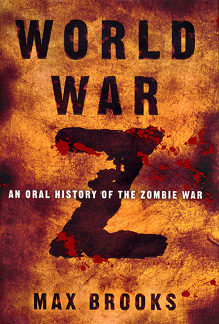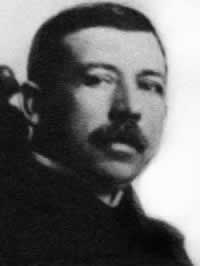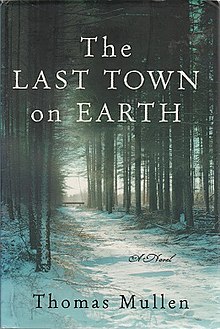
The 1918–1920 flu pandemic, also known as the Great Influenza epidemic or by the common misnomer Spanish flu, was an exceptionally deadly global influenza pandemic caused by the H1N1 subtype of the influenza A virus. The earliest documented case was March 1918 in the state of Kansas in the United States, with further cases recorded in France, Germany and the United Kingdom in April. Two years later, nearly a third of the global population, or an estimated 500 million people, had been infected in four successive waves. Estimates of deaths range from 17 million to 50 million, and possibly as high as 100 million, making it one of the deadliest pandemics in history.

Schindler's Ark is a historical fiction published in 1982 by the Australian novelist Thomas Keneally. It is based on the fictionalized story of the historical figure, Oskar Schindler. The United States edition of the book was titled Schindler's List; it was later reissued in Commonwealth countries under that name as well. The novel won the Booker Prize, a literary award conferred each year for the best single work of sustained fiction written in the English language, and was awarded the Los Angeles Times Book Prize for Fiction in 1983.

A cordon sanitaire is the restriction of movement of people into or out of a defined geographic area, such as a community, region, or country. The term originally denoted a barrier used to stop the spread of infectious diseases. The term is also often used metaphorically, in English, to refer to attempts to prevent the spread of an ideology deemed unwanted or dangerous, such as the containment policy adopted by George F. Kennan against the Soviet Union.
The Hong Kong flu, also known as the 1968 flu pandemic, was an influenza pandemic that occurred between 1968 and 1970 and which killed between one and four million people globally. It is among the deadliest pandemics in history, and was caused by an H3N2 strain of the influenza A virus. The virus was descended from H2N2 through antigenic shift, a genetic process in which genes from multiple subtypes are reassorted to form a new virus.

The Zombie Survival Guide is the first book written by American author Max Brooks, published in 2003. It is a fictional survival manual about zombies, containing information about zombie physiology and behavior, defense strategies and tactics, and includes case studies of possible zombie outbreaks throughout history. Despite its fictional subject matter, the book also includes practical information on disaster preparedness, generally.

World War Z: An Oral History of the Zombie War is a 2006 zombie apocalyptic horror novel written by American author Max Brooks. The novel is broken into eight chapters: “Warnings”, “Blame”, “The Great Panic”, “Turning the Tide”, “Home Front USA”, “Around the World, and Above”, “Total War”, and “Good-Byes”, and features a collection of individual accounts told to and recorded by an agent of the United Nations Postwar Commission, following a devastating global conflict against a zombie plague. The personal accounts come from individuals from different walks of life and all over the world, including Antarctica and outer space. The "interviews" detail the experiences of the survivors of the crisis, as well as social, political, religious, economic, and environmental changes that have occurred as a result.
Protective sequestration, in public health, is social distancing measures taken to protect a small, defined, and still-healthy population from outsiders during an epidemic before the infection reaches that population. It is sometimes referred to as "reverse cordon sanitaire."

The 2009 swine flu pandemic, caused by the H1N1/swine flu/influenza virus and declared by the World Health Organization (WHO) from June 2009 to August 2010, was the third recent flu pandemic involving the H1N1 virus. The first identified human case was in La Gloria, Mexico, a rural town in Veracruz. The virus appeared to be a new strain of H1N1 that resulted from a previous triple reassortment of bird, swine, and human flu viruses which further combined with a Eurasian pig flu virus, leading to the term "swine flu".

In public health, social distancing, also called physical distancing, is a set of non-pharmaceutical interventions or measures intended to prevent the spread of a contagious disease by maintaining a physical distance between people and reducing the number of times people come into close contact with each other. It usually involves keeping a certain distance from others and avoiding gathering together in larger groups.

John Martin Poyer was the Naval Governor of American Samoa, from March 1, 1915, to June 10, 1919. He held the longest term of any American governor appointed over the territory by the United States Government. A Naval Academy graduate, Poyer served in numerous positions and retired in 1906 on account of failing health; however, the navy recalled him to service in 1915 to serve as governor. During the 1918 flu pandemic, Poyer quarantined the territory to stop the spread of the pandemic to American Samoa. Because of his actions, no deaths occurred in American Samoa, and he received the Navy Cross. Upon his final retirement, Poyer had reached the rank of commander.
David Stout was a journalist and author of mystery novels, two of which have been turned into TV movies, and of non-fiction about violent crime. For his first novel, Carolina Skeletons, he won the Edgar Allan Poe Award for Best First Novel.

The 1918 college football season was a season of college football in the United States. There was no consensus champion, with the Official NCAA Division I Football Records Book listing Michigan and Pittsburgh as national champions.

World Made by Hand is a dystopian and social science fiction novel by American author James Howard Kunstler, published in 2008. Set in the fictional town of Union Grove, New York, the novel follows a cast of characters as they navigate a world stripped of its modern comforts, ravaged by terrorism, epidemics, and the economic upheaval of peak oil, all of which are exacerbated by global warming.

Howard Markel is an American physician and medical historian. At the end of 2023, Markel retired from the University of Michigan Medical School, where he served as the George E. Wantz Distinguished Professor of the History of Medicine and Director of the University's Center for the History of Medicine. He was also a professor of psychiatry, health management and policy, history, and pediatrics and communicable diseases. Markel writes extensively on major topics and figures in the history of medicine and public health.

Four Freedoms is a 2009 historical novel by American writer John Crowley. It follows the adventures of several characters centering on a fictional aircraft manufacturing plant near Ponca City, Oklahoma during World War II, specifically from 1942 to 1945. The plant chiefly produces the fictional B-30 Pax bomber. It is Crowley's first novel after the completion of his Ægypt Sequence, and marks a turning in his style from the historically speculative series to historical realism.

The Deceivers: Allied Military Deception in the Second World War, by Thaddeus Holt, is a 2004 historical account of Allied military deception during the Second World War. The book focuses primarily on the work of Dudley Clarke in the Middle East, John Bevan in London, Newman Smith in Washington, and Peter Fleming in the Far East, detailing their work in creating strategic and tactical deceptions for the Allied forces.

Station Eleven is a novel by the Canadian writer Emily St. John Mandel. It takes place in the Great Lakes region before and after a fictional swine flu pandemic, known as the "Georgia Flu", has devastated the world, killing most of the population. The book was published in 2014, and won the Arthur C. Clarke Award the following year.

The 1957–1958 Asian flu pandemic was a global pandemic of influenza A virus subtype H2N2 that originated in Guizhou in Southern China. The number of excess deaths caused by the pandemic is estimated to be 1–4 million around the world, making it one of the deadliest pandemics in history. A decade later, a reassorted viral strain H3N2 further caused the Hong Kong flu pandemic (1968–1969).

Salvation City is a 2010 novel by American writer Sigrid Nunez. The novel follows protagonist Cole Vining after he becomes orphaned by a fictional flu pandemic.

Nights of Plague is a 2021 novel by Orhan Pamuk. Its Pamuk's 11th and longest novel. Inspired by historical events, it is set on a fictitious island, Mingheria, in the eastern Mediterranean between Crete and Cyprus.

















